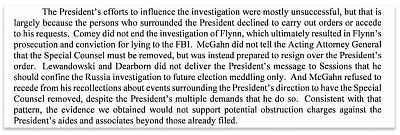AG Jeff Sessions, former campaign chief Corey Lewandowski and White House counsel Don McGahn undermined the president, the special counsel said.
Had President Donald Trump been left to his own devices, the findings in special counsel Robert Mueller's report released Thursday would have likely been far more damning for the commander-in-chief.
Instead, the Mueller report makes clear, Trump's "efforts to influence the investigation were mostly unsuccessful" — but only "largely because the persons who surrounded the President declined to carry out orders or accede to his requests."
Among the figures referenced by Mueller who refused Trump's wishes were White House counsel Don McGahn, former campaign manager Corey Lewandowski and Attorney General Jeff Sessions.
"Our investigation found multiple acts by the President that were capable of exerting undue influence over law enforcement investigations, including the Russian-interference and obstruction investigations," Mueller's report said.
"The incidents were often carried out through one-on-one meetings in which the President sought to use his official power outside of usual channels," the report continued. "These actions ranged from efforts to remove the Special Counsel and to reverse the effect of the Attorney General 's recusal; to the attempted use of official power to limit the scope of the investigation; to direct and indirect contacts with witnesses with the potential to influence their testimony."
Trump, the report outlined, directed McGahn to have Mueller removed as special counsel. McGahn refused, and even prepared to quit over the matter. The report explained that "McGahn ultimately did not quit and the President did not follow up with McGahn on his request to have the Special Counsel removed" — putting on hold an outcome that would likely have opened Trump up to a harsher assessment from Mueller.
In his report, Mueller writes that Trump, after being rebuffed by McGahn, quickly directed Lewandowski "to tell the Attorney General to limit the scope of the Russia investigation to prospective election-interference only."
But Lewandowski, too (as well as Sessions' chief of staff Rick Dearborn) "did not deliver the President's message to Sessions" — again stifling another scenario that may have led to bigger legal trouble for Trump.
In addition, Comey didn't end the investigation of one-time Trump national security adviser Michael Flynn even though Trump had previously asked Comey in a one-on-one meeting to "see your way clear to letting this go, to letting Flynn go."
Comey's refusal, Mueller noted, "ultimately resulted in Flynn's prosecution and conviction for lying to the FBI."
At other times in the report, Mueller noted similar scenarios, including Trump's attempt to get Sessions to "unrecse himself."
But again, Trump's directive was refused, helping Mueller reach a conclusion that, when it came to obstruction, Trump would be largely untouchable.
"Consistent with that pattern, the evidence we obtained would not support potential obstruction charges against the President's aides and associates beyond those already filed," Mueller wrote in the report.












